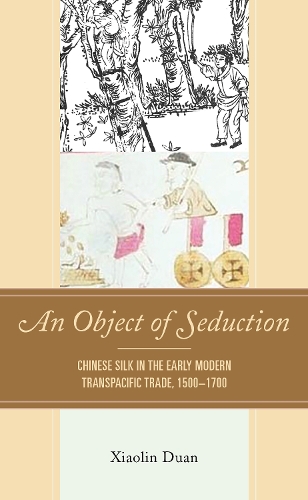
An Object of Seduction: Chinese Silk in the Early Modern Transpacific Trade, 15001700
(Hardback)
Publishing Details
An Object of Seduction: Chinese Silk in the Early Modern Transpacific Trade, 15001700
By (Author) Xiaolin Duan
Bloomsbury Publishing PLC
Lexington Books
7th February 2022
United States
Classifications
Professional and Scholarly
Non Fiction
History of art
General and world history
382.45677390951
Physical Properties
Hardback
230
Width 160mm, Height 228mm, Spine 21mm
544g
Description
In 1573, 712 bales of Chinese silk arrived in New Spain in the cargos of two Manila galleons. The emergence and the subsequent rapid development of this trans-Pacific silk trade reflected the final formation of the global circulation network. The first book-length English-language study focusing on the early modern export of Chinese silk to New Spain from the sixteenth to the seventeenth century, An Object of Seduction compares and contrasts the two regions from perspectives of the sericulture development, the widespread circulation of silk fashion, and the government attempts at regulating the use of silk. Xiaolin Duan argues that the increasing demand for silk on the worldwide market on the one hand contributed to the parallel development of silk fashion and sericulture in China and New Spain, and on the other hand created conflicts on imperial regulations about foreign trade and hierarchical systems. Incorporating evidence from local gazetteers, correspondence, manual books, illustrated treatises, and miscellanies, An Object of Seduction explores how the growing desire for and production of raw silk and silk textiles empowered individuals and societies to claim and redefine their positions in changing time and space, thus breaking away from the traditional state control.
Reviews
By looking closely at silk in China and Mexico in the early modern period, this study contributes to our understanding of the development of the global economy. At the center of the book is silk itself: its colors, its textures, and its power to seduce. Duan uses a wide variety of sources--including casta paintings and Chinese biji essays--to show the ways in which silk was produced and consumed. This book is a must-read for scholars interested in the development of the global economy, as well as those interested in textiles and the histories of consumption and the circulation of goods.
--Ann Waltner, University of MinnesotaDuan achieves a rare trifecta of world history--serious and measured comparisons, deep analysis of interconnections, and a truly transnational framework. As a research work, this book is significant. As a teaching tool, it has enormous potential to liberate students from their preconceptions about the early modern world and the ways people are connected historically and currently.
--Trevor R. Getz, San Francisco State UniversityDuan's engaging study of silk seamlessly integrates economic, environmental, cultural, and religious documentation in the context of global history. Silk was the foremost Chinese export exchanged for silver imports over centuries. On the supply side, silkworms survive with intense skilled labor and access to mulberry leaves.... On the demand side, sumptuary laws in China and New Spain were circumvented via rampant smuggling and dynamic customer preferences. Duan's wide-ranging account of diverse silk products is based upon an impressive array of Asian, American, and European sources, rendering it an essential contribution to textile history and global history.
--Dennis O. Flynn, University of the Pacific, Pacific World History InstituteDuan's study of silk production in China and New Spain offers a long overdue examination of the development of early modern global trade in the Pacific. Meticulously researched and original, Duan's exploration of the production and consumption of silk provides new insights on how manufacturing techniques and clothing styles spread from China to the Americas. She also examines the tensions that arose as global processes articulated themselves in different ways at the local level. This is a valuable and timely study of an underexamined topic of immense scholarly importance.
--Michael Matthews, Elon UniversityThis book will be useful for readers of all levels who are interested in areas that range from global history to the history of colonialism, early modern trade and economic systems, the history of sericulture, and maritime history, as well as those focused more particularly on late-imperial China or Spain and its New World empire. It has also aptly been published as part of a new series launched by the press titled "Empires and Entanglements in the Early Modern World" whose monographs all focus on different connections across regions and oceans. There really is no com-parable monograph that examines the trans-Pacific silk trade, and as such it fills an important gap in scholarship.
-- "The Middle Ground Journal"Author Bio
Xiaolin Duan is associate professor of Chinese history in the Department of History at the North Carolina State University.
